How to Safely Remove Water Spots from Quartz Countertops

How to Remove Hard Water Spots from Quartz Countertops
We will guide you through a safe and effective method for removing water spots from quartz counters without causing damage. You will also learn what water spots are, their cause, and how to prevent and protect against them.
What Are Water Spots
Mineral deposits are also known as hard water spots, water stains, and watermarks. They are mostly calcium and magnesium but sometimes contain soap residue and salts from water softeners. It's common to find them on countertops, sinks, glass shower doors, and shower curbs and thresholds. Mineral deposits on quartz countertops require specific cleaning methods to remove them without causing a dull spot or blemish.
What Causes Hard Water Spots
Water spots are the solids left behind from water that has evaporated. These solids are considered mineral deposits.

Quartz-Safe Cleaners Can Not Remove Hard Water Spots
Quartz countertops are considered engineered stones because they are "manufactured" using mostly natural materials, but resins are added during the manufacturing process which are sensitive to acidic solutions. This is why manufacturers recommend using cleaning solutions that are pH-neutral. This causes products with a low-pH (meaning acidic) such as vinegar, lemon juice, and more, to blemish these engineered resins. these types of marks are referred to as "etching" the surface. Etch marks look similar to water spots, but cannot be cleaned, they need to be repaired.
Hard water spots, unfortunately, can not be removed by pH-neutral cleaners. Although certain cleaning products specialize in removing such deposits, the large majority of them are acidic or alkaline-based. This is why prevention is key.
With this in mind, here is our list of guidelines for removing hard water spots and mineral deposits from quartz countertops:
How to Clean Hard Water Spots
Your options for cleaning hard water spots from quartz countertops sound counterintuitive but are safer and easier than they sound. Since recommended quartz cleaners are pH-neutral, they are ineffective against mineral deposits/water spots, we will have to use very mild friction to remove them.
To remove water spots from quartz countertops safely use a razor for any heavy buildup, and super-fine steel wool (grade #0000) for the light residue. It is essential that your steel wool is grade #0000 since other variations will be too abrasive.
Do’s
-
Use grade #0000 super-fine steel wool to remove light water spots, lightly rubbing the deposits in a circular motion.
-
For heavier spots, Carefully use a new, sharp straight razor or scraper.
-
Take preventative measures to prevent water stains and mineral deposits from building up
Don’ts
-
Don’t use aggressive/strong cleaners on your quartz or granite countertop
-
Don’t use vinegar or lemon juice; they can etch your surface
-
Don’t use non-neutral household cleaners on your quartz
-
Don’t use water and dish soap to clean your quartz, (without a rinse and wiping off excess water left behind) as they can lead to more water spots, mineral deposits, and soap-scum build-ups
The easiest method of removing hard water spots from quartz is to use Super-Fine Steel wool (#0000 grade). Begin in an inconspicuous (hidden) area, buffing the surface in a circular motion. Ensure the area is undamaged, and proceed to mimic the technique along the water spots. This should be enough to remove light mineral deposits from the surface.
If heavier deposits exist, it may be best to carefully scrape them off of the surface with a straight razor.

Preventing Water Stains and Mineral Deposits
Removal is difficult, so prevention is key.
Preventing water spots fon quartz countertops is easy. All you need to do is wipe the surface dry after each and every use because the solids in your water are most likely the cause.
It is common for people to clean their countertops with soapy water, but if you're not going to rinse the surface and wipe dry, this should be avoided. Like washing a composite sink or glass with a soapy wet rag or sponge, doing this to your quartz can create a cloudy haze over time from soap scum or leftover mineral deposits.
For proper prevention, utilize a quartz cleaner formulated with ioSeal Protectants. ioSeal forms an ionic bond to the surface, creating a layer that resists incoming stains and messes such as hard water spots.
Conclusion
My name is Tom Munro and I hope you've found this information to be helpful. With a history of more than 35 years within the tile and stone industries, Supreme Surface products and methods are proven to work in the field. I believe that by educating consumers and other professionals, we can all learn from each other to prevent and resolve common issues with quartz countertops and more.
Helpful Links:
- Tom Munro